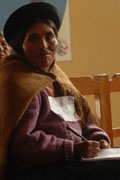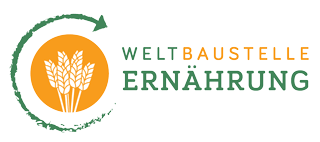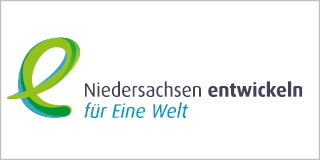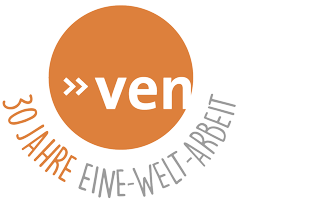 Bolivien ist stark vom Klimawandel betroffen, dies zeigt sich besonders deutlich an den Wetterextremen El Niño und La Niña, die für Dürren, Überschwemmungen und Verwüstungen sorgen. Ebenso beeinträchtigen steigende Temperaturen das Leben der Menschen, von denen ein Großteil in der Subsistenzwirtschaft tätig ist. Paulina Pally, von der Sie hier mehr erfahren können, ist seit mehr als zehn Jahren für die Vesorgung ihrer Familie zuständig.
Bolivien ist stark vom Klimawandel betroffen, dies zeigt sich besonders deutlich an den Wetterextremen El Niño und La Niña, die für Dürren, Überschwemmungen und Verwüstungen sorgen. Ebenso beeinträchtigen steigende Temperaturen das Leben der Menschen, von denen ein Großteil in der Subsistenzwirtschaft tätig ist. Paulina Pally, von der Sie hier mehr erfahren können, ist seit mehr als zehn Jahren für die Vesorgung ihrer Familie zuständig.
Paulina - A Bolivian Woman
Paulina Pally is member of a women's organization in Cochi Piacala, located in El Choro (Oruro, Bolivia). She finished high school in the city of Oruro. Since she was the only woman in her family, she had no chance to study, but had to return to her community. Although she was very young, she was in charge of all the duties at home including the agricultural production and the cattle. For more than ten years, Paulina dedicated all her time and energy to these activities. However, her recent contact with a women's organization in her community has allowed her to receive information, develop other abilities and to become a leader.
As a consequence of her experience in agriculture, Paulina understands the impacts of climate change in her community. She commented that, "The temperature has risen a lot and the people in the village are not used to it. Mosquitoes have appeared in the rainy season which is not usual in the altiplanic region. The problem is that these mosquitoes are not only bad for our people; they also attack our lambs and make their wool fall out. We try to take care of our lambs with some special herbs but we cannot totally avoid the problem. Some professionals have told us to use chemical products. But we do not like this idea and we are afraid that they could cause more harm because we also eat our lamb's meat".
Paulina also says that, "With the women's organization we have begun to sow some new vegetables like lettuce. Nevertheless, either the production is too low or the vegetables are too small, like some onions we tried to harvest. We believe that this is because we do not have enough water for the irrigation and we also have realized that it is essential to look for fertile soil. A petroleum spill that occurred some years ago caused a lot of damage and some places are no longer fertile... Anyway, we decided to consider all these aspects and still try to produce different vegetables".
Text: Andrea Guzmán
Foto: Verband Entwicklungspolitik Niedersachsen e.V.




